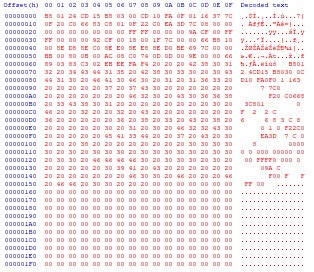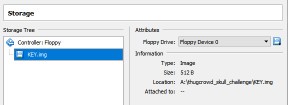ThugCrowd DEFCON Badge Challenge
Thugcrowd DEFCON Badge Challenge Link, Mirror:
This was one of my first introductions to non-standard CTF-y solvable challenges. At first glance, challenge has a few things which seem to be noteworthy:
- BEGIN PRIVATE KEY seems indicative of a cryptographic key. BEGIN PRIVATE KEY is indicative of the PKCS#8 format, which, in this format appears to be unencrypted (since it lacks the ENCRYPTED phrase in the header).
- The body of the key is not base64 encoded as we would expect, instead, it appears to be in hexadecimal.
- The skull resembles the Punisher logo, this might be important.
- There are two MD5 sums near the bottom, and a binary.
My first step was to download the binary, skull, and run md5sum on it to see if the value matched:
user@box:/mnt/a/thugcrowd_skull_challenge$ md5sum skull 7ffb9fbb97af9533f0ed771b3856d7a8 skull
This file matches the checksum on the website, which is a good start. I tried doing the same with the “key”, and ended up spending way too much time trying to format the file to get a match on the checksum listed on the page. What I ended up doing was copying the contents of the “key” into HxD, and saving that as a binary:

user@box:/mnt/a/thugcrowd_skull_challenge$ md5sum key 34d00b96da65131a759ebe54d42d3136 key
I ran binwalk on both binaries, which resulted in the following:
user@box:/mnt/a/thugcrowd_skull_challenge$ binwalk key DECIMAL HEXADECIMAL DESCRIPTION -------------------------------------------------------------------------------- user@box:/mnt/a/thugcrowd_skull_challenge$ binwalk skull DECIMAL HEXADECIMAL DESCRIPTION -------------------------------------------------------------------------------- 0 0x0 ELF, 64-bit LSB executable, AMD x86-64, version 1 (GNU/Linux) 216 0xD8 ELF, 64-bit LSB processor-specific, (GNU/Linux) 325235 0x4F673 Copyright string: "Copyright (C) 1996-2013 the UPX Team. All Rights Reserved. $"
Running the skull binary shows us:
ptl@kali:~/tc_badge$ ./skull This message requires that you supply a key to decrypt
At the time, I wasn’t really sure what to do (I forgot about the key), so I decided to try my hand at a little debugging to see if I could get anywhere. I used gdb, the GNU Debugger.
ptl@kali:~/tc_badge$ gdb -f ./skull GNU gdb (Debian 8.2.1-2) 8.2.1 Reading symbols from ./skull...(no debugging symbols found)...done. (gdb) r Starting program: /home/ptl/tc_badge/skull The gates of heaven remain closed Program terminated with signal SIGKILL, Killed. The program no longer exists.
This didn’t prove to be much help, but the message The gates of heaven remain closed seemed like something that wasn’t part of gdb. Searching for this string online:
Without going too deep down the path, at this point I decided that it was probably better to try to not find a way around the way the challenge was meant to be solved, so back to the skull key. I ran the strings command on the binary I created from the hex dump on the website - the binary was expectedly very small, so it seemed like a decent option:
ptl@kali:~/tc_badge$ strings key B8012 4CD15 B8030 0CD10 FA0F0 1 163 7 7C0 F20 C0668 3C801 0 F 2 2 C 6 6 8 3 C 8 0 1 0 F22C0 EA3D 7 C 0 8 00000 0 000 00000 00 00 FFFF0 000 0 09A C F00 F F FF 00
Running file gives us:
ptl@kali:~/tc_badge$ file key
key: COM executable for DOS
Having some experience with Windows, I knew that .COM files are part of the DOS boot process, one specific example being the command line interpreter, COMMAND.COM.
 I went back to the file in HxD, and I looked up the first few bytes in Gary Kessler’s file signature table to see if I could verify this, but I wasn’t able to find it in the table. Searching for them instead led me to a better result:
I went back to the file in HxD, and I looked up the first few bytes in Gary Kessler’s file signature table to see if I could verify this, but I wasn’t able to find it in the table. Searching for them instead led me to a better result:
- Alex Parker’s Writing a Bootloader Part 1
- Alex Parker’s Writing a Bootloader Part 2
- Alex Parker’s Writing a Bootloader Part 3
- Alex PArker’s Writing a Bootloader Presentation
Wikibooks has a great writeup about the makeup and technical details behind bootloaders - this article helped me understand more about what I was possibly dealing with, but I was a bit unsure as to if this was actually a bootloader, since it was missing the very clearly required/documented 0xAA55 signature designating a valid boot sector. I tried executing this file in multiple Windows OS (7, DOSBOX, FreeDOS), but I was unable to get it to run in any capacity. My next step was to attempt to boot it inside of VirtualBox as a floppy disk image.

Once booting, we see something reminiscent of the result of the strings command we ran above. ThugCrowd has a thing for making awesome ASCII art, so looking at with a less technical interpretation might be a good idea (it does appear to be somewhat abstract):
KEY IS SAKURA is clearly the message. Maybe this is the key to decrypt the binary?
ptl@kali:~/tc_badge$ ./skull SAKURA
██
──────────────────────────────────────────────────────────── ▒██ ──────
████████ ███ ██ ███ ██ ██████ ██████ ███████ ███████ ██ ▒██ ███████
▒▒▒▒███ ▒███ ▒██▒███ ▒██ ███ ███▒▒▒ ▒▒▒▒▒▒▒██▒▒▒▒▒▒██▒██ █▒██▒▒▒▒▒▒▒██
▒███ ▒███████▒███ ▒██▒███ ██▒███ ██████ ██ ▒██▒███████ ███ ▒██
▒███ ▒███▒▒██▒███ ▒██▒███ ▒██▒███ ▒██▒▒██ ▒██ ▒██▒███▒███ ▒███ ▒██
▒███ ▒███ ▒██▒▒█████ ▒▒██████▒▒██████ ▒██ ▒▒██▒▒█████ ▒██ ▒▒██ ▒██████
▒▒▒ ▒███ ▒▒ ▒▒▒▒▒ ▒▒▒▒▒▒ ▒▒▒▒▒▒ ▒▒ ▒▒ ▒▒▒▒▒ ▒▒ ▒▒ ▒▒▒▒▒▒
┌───── ▒▒▒ ───────────────────────────────────────────────────────────┐
│ │
│ Congrats! You just figured out the puzzle! │
│ If you were the first to solve it and alert us, you have just won │
│ a really beautiful custom Defcon Badge / Embedded lab! Lucky you! │
│ │
│ Tweet a screenshot of this to @thugcrowd or email to │
│ [email protected] │
│ │
│ Badges will be available for pick up at Defcon. If you aren't │
│ attending Defcon, we can give the badge through alternative means! │
│ │
│ Thanks for playing! │
│ │
└──────────────────────────────────────────────────────────────────────┘
Verification Hash: aHR0cHM6Ly90d2l0dGVyLmNvbS90aHVnY3Jvd2Q=


